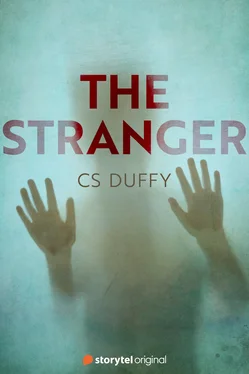It had been so cold that day that Fergus had been scared to take Alfie outdoors. Just standing next to the window had given Fergus a headache and he remembered Tess’s mother fussing about Alfie getting a chill when they went for a walk last Boxing Day, which had been positively balmy in comparison. Fergus could see Swedish children on the street below, waddling along the icy pavement in brightly coloured snowsuits. He was afraid Alfie would get ill if he exposed him to the Arctic temperatures and it would be his fault, so the two of them had been trapped in the flat all day long, fractious and claustrophobic, with the intermittent sound of the baby crying drilling into Fergus’s skull. During Alfie’s nap Fergus resorted to sitting out on the balcony bundled up in a ski jacket with a blanket wrapped around his knees. His nose and cheeks were stinging with cold by the time he heard Alfie announce he was awake by yelling for a banana. When he’d finished his snack, Alfie scampered across to his collection of toys and started chatting to them. Watching him, Fergus’s stomach twisted as he wondered whether or not he was speaking Swedish. Was it a fluke the other day in the laundry room? Alfie was giggling. ‘ Sluta, ’ he muttered.
How could he understand what was going on with Alfie if he didn’t understand what he had just said to his George Pig doll? Fergus had been listening dutifully to his Learn to Speak Swedish tapes for hours every night, from the moment Alfie fell asleep until either Tess got home or Fergus nodded off, but it seemed that learning an entire language from scratch in a few days by sheer force of will wasn’t possible; the more Fergus listened, the dimmer the prospect of ever understanding a bloody syllable seemed.
He strongly suspected that the crabby old lady from the laundry room wouldn’t be overly disposed to help him understand Alfie even if he could track her down again, and that American said she didn’t speak Swedish either. A rueful grin came to Fergus as he pictured himself knocking on all the neighbours’ doors again — excuse me, hello? Can anyone tell me what my child is saying? — while they all peered at him from behind their peepholes.
The wind whistled through the old building, and Fergus shivered despite the bedcovers. An icy bedroom was nothing new to him. Fergus had grown up in a centuries old castle, an ancient family seat which was generally colder inside than out.
One Christmas Eve when he was around eight or nine, a drunken uncle stumbled into his bedroom. Fergus was wide awake in the heavy four poster bed, hoping for a glimpse of Santa. The uncle had staggered unsteadily to his bed and proceeded to cheerfully slur the story of their relative Charlie MacDonald, who lost a leg at the Battle of Culloden at sixteen years old and had been brought home to recuperate in this very room. What was left of the leg had quickly turned gangrenous, and the young man had faded slowly, excruciatingly, for weeks, wracked with fever and chills, until one day he had dragged himself, step by agonising step, across the room and toppled himself from the window.
‘A true warrior doesn’t die in bed,’ the uncle had muttered proudly, his voice thick and maudlin with whisky. He’d patted Fergus on the leg then, and stumbled away leaving him alone in the darkness. Fergus hadn’t been frightened. It was a relief, if anything, to finally have an explanation for the slow, dragging footstep he had heard from time to time when he woke in the night. Charlie didn’t mean him any harm, that much was clear to him; indeed had never appeared as any more than a curious noise in the darkness, and occasional sense of someone simply ‘there’.
One day after school he’d brought Charlie up with Morna, the housekeeper. He was sitting in a high stool in the cavernous kitchen drinking a hot chocolate, watching her make scones. Morna was his happiest childhood memory. It was Morna that Fergus came running to if he fell off his bike in the gravel of the great drive, or if his brothers had been particularly nasty to him. She was a wee wizened woman, with steel grey hair tied in a severe bun and a story or superstition to explain everything from why bread dough wouldn’t rise to why angry men battered on the giant oak door looking for his father.
‘Oh aye. I mind old Charlie. He’s been mucking about this castle for many a year.’ She told him that ghosts were just the mind’s way of processing energy that lingers in the atmosphere.
‘We all have energy that surrounds us,’ she explained, industriously dusting the ancient kitchen counter with flour to roll out the pastry. ‘All our thoughts and feelings and ideas sort of surround us in the atmosphere like, like a wee personal fog —’
‘Like midges?’, twelve year old Fergus asked, picturing a cloud of buzzing thoughts zipping to and fro around his head like midges did in the summer.
‘Aye, something like that. Some people don’t even notice, and others are aware. The same way some folk can hear a tune and others can’t.’
‘I can hear a tune.’
‘You can’t sing one though, can you?’
‘No.’ Fergus shook his head with a giggle.
‘Well it’s a bit like that. Some people might pick up on it, but not understand what’s made them a wee bit sad or excited all of a sudden, and others’ heads are spinning with it all the time.’
She broke off then, and kneaded the dough in silence a moment. Fergus thought she looked tired, and wondered if her ‘head’ was spinning with it all the time.
‘And sometimes,’ she added, ‘the energy is strong enough that it can still be felt after the person’s gone, like the boom after Concorde has gone by, remember we saw that on the news?’
‘Or if somebody farts and runs away’ Fergus blurted. Morna laughed.
‘Aye, exactly,’ she chuckled, her fingers nimbly working the dough into twelve scone shapes. ’That’s just what it’s like.’
When his father died, Fergus systematically searched the castle for a similar sense of him. Unshed tears creating an unbearable pressure in his chest, fifteen year old Fergus tramped up and down narrow, crooked corridors for days and days, desperately seeking any indication that his father was still there. He gave up when he finally remembered that he felt Charlie’s presence in the room in which he died. Father died in prison: if his energy was present still, it would be there.
Fergus heard the front door open with a clatter. Tess was home. He had no idea what time it was, but it must be late. He realised with an uncomfortable flicker of guilt that he hadn’t particularly noticed she wasn’t home yet when he went to bed. She must have had another client dinner or one of those never ending team brainstorms she complained about.
He heard her boots fall to the wooden floor with a thud and a stumble that suggested whatever she had been up to, alcohol had been involved. Then he heard something else. She giggled. Shushed someone. Had she brought someone home? A girlfriend from the office who had missed the last train out to the suburbs? Then he heard her whisper again and realised there was no second voice. She was talking into her mobile. Softly. In the dark. Fergus reached for his phone on the bedside table and looked at the screen. 1.20 a.m. Tess was whispering to somebody at 1.20 a.m.
Tess tiptoed into the room and Fergus heard Alfie’s joyful whisper, Mummy! His heart lurched in a way he wasn’t proud of.
‘You awake?’ A few minutes later Tess lifted his arm so she could slip into the nook of his shoulder. Fergus didn’t move.
‘Ish,’ he muttered.
‘Alfie says you didn’t kiss his ten toes at bedtime. You’re supposed to kiss every one of his toes and say goodnight to them all so that he has ten good dreams.’
Читать дальше











